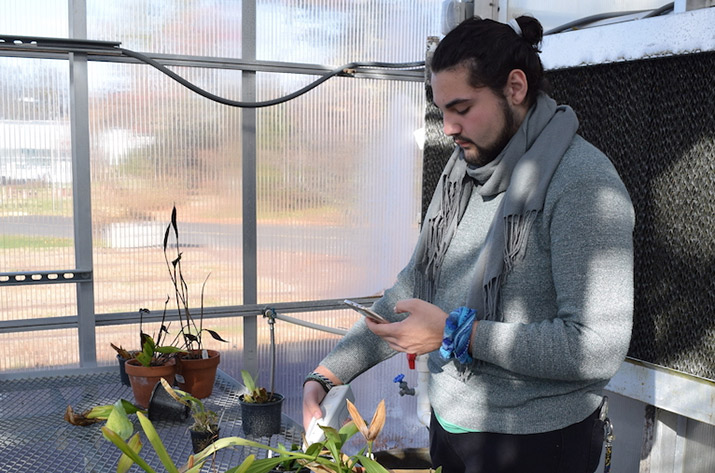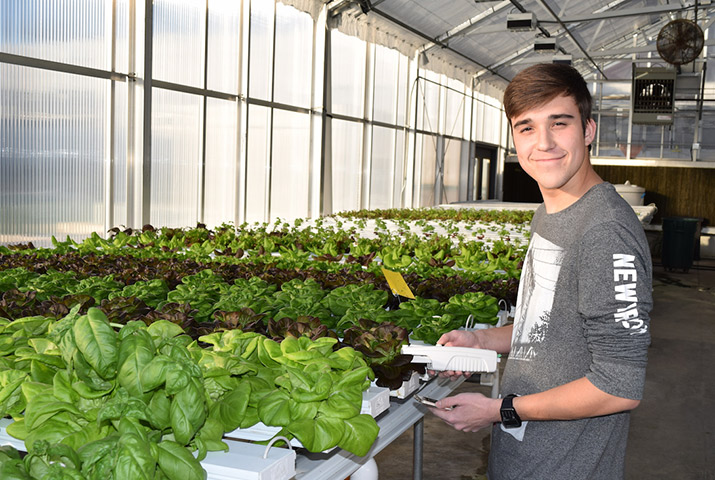Students Use a Mobile App for Undergraduate Research
Most college students have apps on their phones. You might see Snapchat, Instagram or TikTok on a typical student’s phone. Three biology sophomores at Delaware Valley University are using something a little different. They’re sharing plant science data with a global network of scientists using an app.
In Student Research, a course offered through the University’s Experience360 Program, students are collecting data on plants using a small, handheld device that connects to an app on their phones. PhotosynQ, the app they’re using, immediately uploads their data to share with users all over the world.
Researchers, educators, farmers and citizen scientists use PhotosynQ to collect photosynthesis-related data using a small handheld device that connects to the mobile and desktop apps. The PhotosynQ online platform allows over 4,900 users in 25 countries to share and discuss data. Using this wireless technology, plants can be studied in the field, non-invasively, and the information can be used to identify genotypes of interest.
Photosynthesis is the process by which plants convert energy from the sun into chemical energy in the form of sugars. In the process, water and carbon dioxide are taken in and oxygen is released.
Students in the Student Research course work on independent research under the guidance of a faculty mentor. The semester-long course allows undergraduate students to get a taste for independent research. The course is used to prepare students for graduate-level research and their careers. Students choose topics that are of interest to them to pursue for a whole semester. Dr. Cynthia Keler, a professor of biology, coordinates Student Research, which brought together 20 students and their advisors this semester.
Dr. Elizabeth Skendzic, an associate professor of biology, is advising the students who are using PhotosynQ. Two of the students in the course, Ashlynn Masters ’22 and Brandon James ’22, studied three different pathways for photosynthesis (C3,C4 and CAM).
They measured plants to see what time of day photosynthesis activity was highest for the different types. Through the project, they learned about why certain plants respond better to dry and hot conditions.
“I think it’s important that we are getting to do hands-on research instead of just reading a book,” said Masters, who wants to be a biologist. “This project opens the door for many research projects I could do in the future.”
James enjoyed being able to see the variety of projects people were doing around the world using PhotosynQ.
“PhotosynQ allows you to look at all the different projects that are using the device worldwide,” said James. “This project allowed me to learn about plants and photosynthesis in a way that I wouldn’t be able to in class.”
After DelVal, James plans to attend graduate school and pursue a career in research.
“The Experience360 Program allows you to develop skills as an individual that you wouldn’t get to practice in a whole class of people,” said James.

Credit: Delaware Valley University. Brandon James ’22, a biology sophomore, studied photosynthesis during the fall 2019 semester as part of an independent research project.
Colton Nester ’22 worked with hydroponic lettuce to find out if photosynthesis continues once the lettuce is harvested, packed and refrigerated.
Nester said he enjoyed doing a project instead of just reading a textbook.
“This project will help me build research skills as an undergraduate,” said Nester.

Credit: Delaware Valley University. Colton Nester ’22, a biology sophomore, spent the fall 2019 semester working with hydroponic lettuce for the Student Research course.
Being able to run research projects in the greenhouse is helping to get the students excited about research and is providing valuable experience for their futures. At the end of the semester, students present their research to the University and community guests.
Student Research is one of the activities students have to choose from to fulfill their experiential-learning requirements. To graduate, students are required to complete and, reflect on multiple experiential-learning activities. Required activities are tailored based on the student’s major and desired career path. While junior and senior students often conduct research, the participation of freshmen and sophomores is on the rise.
The Student Research course is supported through the generous contributions of Bristol-Myers Squibb. Grant funding from Bristol-Myers Squibb allows students to do higher-level work by covering the costs of the equipment and supplies required for their individual projects.